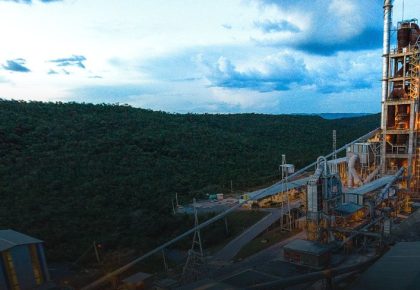
- Global cement sales volume in the quarter was 9.6 million tonnes, down 2% compared to the same period last year.
- Adjusted EBITDA was R$1.4 billion, 12% lower than in 2Q21, as a result of cost pressure and the appreciation of the Brazilian real.
- Leverage, measured by the net debt/adjusted EBITDA ratio, was 1.99x, in line with the company’s financial policy.
- The credit risk agencies Moody’s and Fitch maintained the company’s investment grade rating, with a stable outlook.
- In May, the company made a bond tender offer (Voto41) in the international market in the amount of US$221.8 million, and debenture issuance of BRL 1 billion.

Votorantim Cimentos ended the second quarter of 2022 with consolidated net revenue of R$6.7 billion, an increase of 15% compared to the same period last year. This result was primarily due to favorable price dynamics, in addition to the positive impact of additional sales resulting from the acquisitions concluded in 2021. In the second quarter of the year, the company’s global cement sales totaled 9.6 million tonnes, down 2% from 2Q21.
“Several factors impacted the world economy, which had already been weakened by the pandemic: higher-than-expected inflation across the world (especially in Brazil, the United States and Europe), tighter financial conditions, a worse-than-expected slowdown in China, reflecting COVID-19 outbreaks and lockdowns, and further negative repercussions from the war in Ukraine, with an increase in the cost of fuel, freight and energy. Despite this challenging environment, the company demonstrated its operational resilience through cost management and pricing pass throughs. As a result, our numbers in the second quarter of this year, despite being lower than 2Q21, were better in comparison with historical records, surpassing our results in 2020, 2019 and 2018,” said Marcelo Castelli, Global CEO of Votorantim Cimentos.
The company ended the second quarter with R$1.4 billion consolidated adjusted EBITDA (earnings before interest, taxes, depreciation and amortization), 12% lower than the same period in 2021, primarily due to cost pressure in all regions, in addition to the negative impact of the exchange rate. The EBITDA margin in the quarter was 20%, 7 percentage points lower than 2Q2021.
Net Income in 2Q22 was R$366 million, 47% lower than the same period last year. This result in the second quarter is primarily due to a drop in operating income and higher net loss in the period caused by the payment of premium for the Voto41 bond tender offer.
At the end of the second quarter of 2022, leverage, measured by the net debt/adjusted EBITDA ratio, was 1.99x, an increase of 0.44x compared to the end of 2021 due to the seasonal period in cash generation and the reduction in adjusted EBITDA in the period, but in line with the company’s financial policy.
“Despite the slowdown in the world economy, Votorantim Cimentos continues to operate within solid financial metrics and with high liquidity, maintaining its investment grade status with a stable outlook attributed by the credit rating agencies Moody’s and Fitch. The company’s leverage remained at stable levels and in line with our financial policy. In May, we carried out a transaction in the international market that repurchased the most expensive debt in our portfolio, taking advantage of attractive market rates. And we used funds from debt issuances in the local market with more attractive rates to finance our operation,” said Bianca Nasser, Global CFO of Votorantim Cimentos.

Performance by region – In Brazil, Votorantim Cimentos’ net revenue was R$3.2 billion in the second quarter of 2022, a 24% increase compared to the same period last year. Given the challenging macroeconomic environment in the country, the increase in revenue was primarily due to favorable price dynamics. Adjusted EBITDA in the quarter was R$606 million, down 9% from 2Q21 due to a drop in sales and cost pressure caused by high commodity prices and local inflation, which were substantially mitigated by local price dynamics. According to the National Cement Association (SNIC), cost inflation has strongly impacted the sector. One example is the price of petroleum coke, the main source of energy for the cement industry, which increased 73.5% in the last 12 months. In addition to coke, the price of electricity, freight, bagging materials, gypsum and refractories continues to significantly increase, according to the SNIC.
In North America, net revenue was R$2.1 billion in 2Q22, an increase of 8% compared to the same quarter last year, as a result of strong demand in Canada and the United States, combined with favorable price dynamics. Adjusted EBITDA in the region was R$520 million in the second quarter, down 11% from 2Q21. This decrease was due to the impact of inflation on variable costs, mainly fuel and energy, in addition to the appreciation of the Brazilian real in the quarter.
In the region that includes Europe, Asia and Africa, Votorantim Cimentos’ net revenue increased 13% in the second quarter, totaling R$841 million. This positive result was primarily due to price dynamics in all countries where the company operates and sales growth in Spain, both organic and brought by the additional volume resulting from the acquisition of Cementos Balboa. Adjusted EBITDA in the region was R$167 million in the quarter, down 9% from 2Q21, primarily as a result of the exchange rate impact when compared to last year. Considering the operating result in euro, there was a 10% growth in EBITDA in 2Q22 compared to the same period last year. Pricing dynamics and favorable market conditions in the region have mitigated pressure on costs, especially of fuel and energy.
In Latin America, net revenue in the second quarter of the year was R$205 million, down 17% from 2Q21. This result was impacted mainly due to Uruguay’s market dynamics after the entry of a new competitor in mid-2021 and the most favorable comparative base in 2021. Bolivia experienced favorable price dynamics, with a stable cement volume demand. Adjusted EBITDA in the region was R$41 million in 2Q22, down 42% compared to 2Q21. In addition to the market conditions in Uruguay, the pressure of cost inflation in both countries and the appreciation of the real also had a negative impact on the results.



